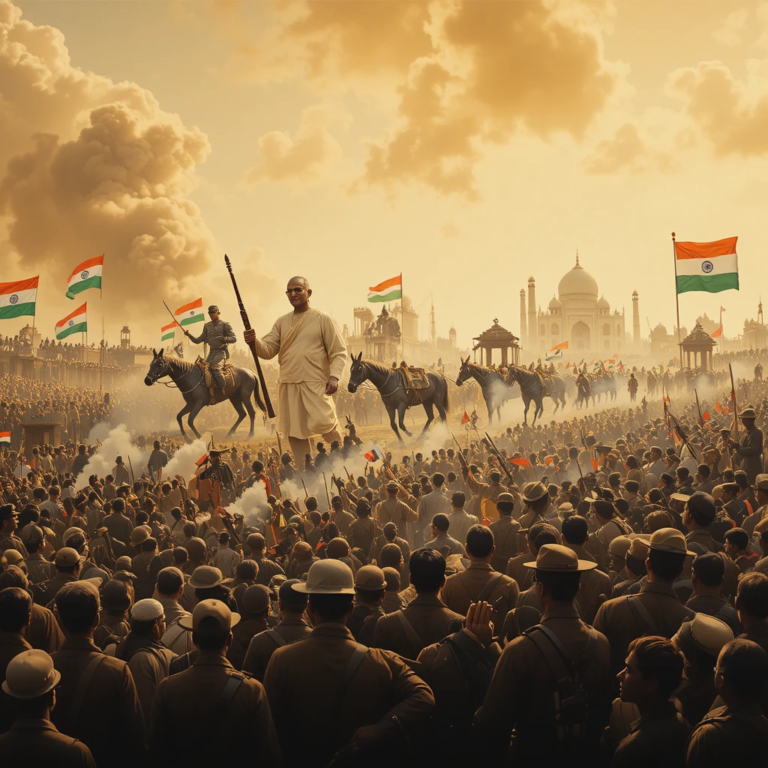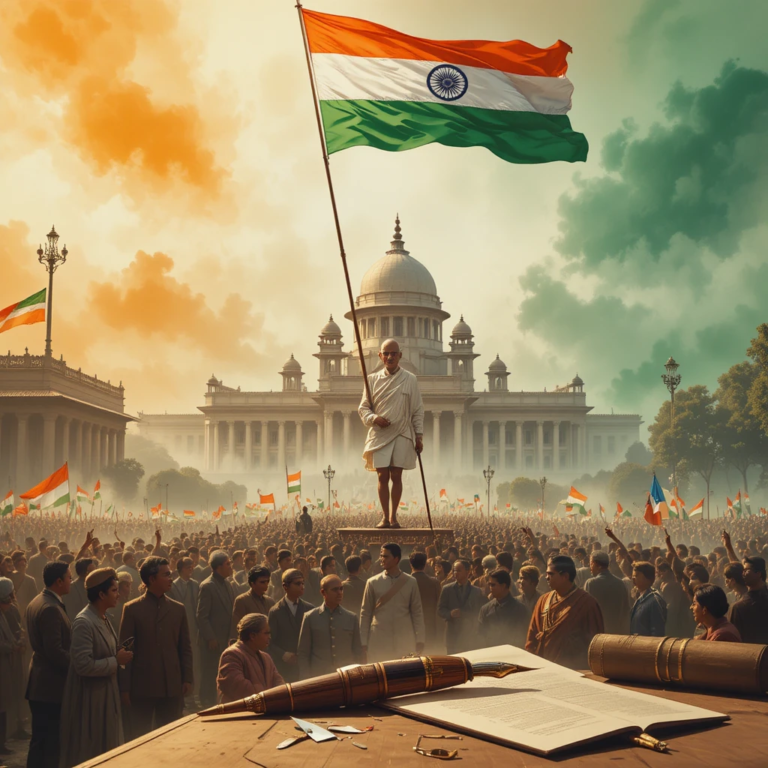The Indian Constitution, a monumental achievement in the history of modern nation-states, was designed to create a secular, democratic, and just society. But when this sacred document comes into the hands of fundamentalists or criminals, its very essence and values can be distorted. Fundamentalists may exploit it to impose an ideology, while criminals will manipulate its provisions to safeguard themselves and perpetuate a culture of impunity. This article investigates how the misuse of constitutional provisions by such groups can corrode the democratic fabric of India, weaken its institutions, and ultimately harm the interests of the people.
Table of Contents
1. Introduction
The Constitution of India is a unique document that not only provides a legal framework for governance but also serves as a moral compass for the functioning of democracy. Its goal is to secure justice, liberty, equality, and fraternity, ensuring that every citizen, regardless of religion, caste, or gender, is treated with dignity. The vision of the Constitution’s framers was to build an India where secularism, democratic governance, and individual freedoms would thrive. However, the integrity of the Constitution is heavily dependent on its interpretation and implementation.

When fundamentalists or criminals manipulate the Constitution, its original intentions are distorted to suit their purposes. The document, which aims to protect the rights of all citizens, becomes a tool for consolidating power, marginalizing communities, and fostering a climate of fear and inequality. The article aims to explore these distortions, both in the past and present, and to assess the broader implications for Indian democracy.
2. Understanding Fundamentalism and Criminalization of Politics
2.1 What is Fundamentalism?
Fundamentalism is often seen as an extreme and rigid interpretation of religious or ideological principles. It can manifest in various forms, but its hallmark is a rejection of pluralism, tolerance, and democratic values. In India, Hindu fundamentalism has been particularly prominent in the political sphere, parties advocating for policies that promote the idea of Hindu nationalism (Hindutva). This movement seeks to impose a singular cultural and religious identity upon the diverse mosaic of Indian society, often at the expense of the country’s secular and pluralistic foundations.
The impact of fundamentalism on the Constitution is most visible in its manipulation of legal provisions related to religious freedom, secularism, and personal liberty. For instance, while the Constitution guarantees the freedom of religion under Article 25, fundamentalist elements frequently use the law to impose discriminatory practices, often targeting religious minorities like Muslims, Christians, and Sikhs.
2.2 The Rise of Criminalization in Indian Politics
Another significant threat to the Constitution is the criminalization of politics, which has become increasingly prominent in India’s political landscape. The entry of individuals with criminal backgrounds into politics has reached alarming levels, with a staggering number of lawmakers facing charges related to corruption, murder, and other serious offenses. According to the Association for Democratic Reforms (ADR), as of 2021, more than 43% of sitting MPs in the Indian Parliament have criminal cases against them. Furthermore, 29% face serious charges, including murder and rape (ADR, 2021).

The criminalization of politics undermines the sanctity of democratic processes, as criminals often exploit political office to shield themselves from legal accountability. By controlling political parties, candidates with criminal backgrounds manipulate electoral processes, reduce transparency, and undermine public trust in democratic institutions.
3. The Constitution in the Hands of Fundamentalists
3.1 Misuse of Secularism
Secularism, as envisaged in the Constitution, is a crucial pillar for maintaining peace and harmony in a country as diverse as India. However, when fundamentalists gain control, they manipulate this concept to suit their agenda. They often use religion as a tool to consolidate political power, undermining the Constitution’s promise of equal treatment for all religions. For instance, policies like the Citizenship Amendment Act (CAA) and the National Register of Citizens (NRC) disproportionately target Muslims, labeling them as outsiders while offering preferential treatment to non-Muslim religious minorities from neighboring countries.

The CAA, passed in December 2019, was widely criticized for discriminating against Muslim refugees, creating a sharp divide between different religious communities. Fundamentalist groups justified this move as an effort to protect persecuted religious minorities but ignored the fact that the law violated the secular nature of the Indian Constitution. Similarly, the NRC, which was first implemented in Assam, threatened to render millions of Muslim citizens stateless by demanding proof of citizenship, further alienating marginalized communities.
3.2 Manipulation of Free Speech and Media
One of the primary tools used by fundamentalist groups to enforce their ideology is the suppression of free speech. Under the guise of protecting national integrity, governments can silence dissent and restrict independent journalism. The Sedition Laws under Section 124A of the Indian Penal Code (IPC) have long been used to stifle free speech, targeting journalists, activists, and academics who question the government’s policies or raise concerns about the country’s direction.

In recent years, there has been a growing trend of censoring the media, with the government using agencies like the Central Bureau of Investigation (CBI) and Income Tax Department to intimidate media outlets critical of its actions. As a result, many journalists have been forced to toe the line of the ruling government, stifling independent journalism and curbing the democratic discourse essential for a vibrant democracy.
3.3 Discrimination Against Minorities
One of the most concerning manifestations of fundamentalism is the blatant discrimination against minority communities. This is not only seen in the political and legislative spheres but also in everyday life. Discriminatory laws such as the Uniform Civil Code (UCC) have been introduced by some political parties with the aim of imposing a singular set of laws on all citizens, regardless of religious affiliations. While the intention behind such laws may be to promote national unity, they often undermine the rights of religious minorities by disregarding their personal laws and customs.
Moreover, religious minorities often face violence and persecution at the hands of fundamentalist groups, with little action taken by the authorities to protect them. The Gujarat riots of 2002 and the Delhi riots of 2020 are prime examples of how fundamentalist ideologies, when left unchecked, can lead to widespread violence and suffering for minority communities.
3.4 Distortion of History and Education
Another dangerous trend fostered by fundamentalism is the distortion of history and education. Political parties, particularly those with a right-wing agenda, have attempted to rewrite textbooks to reflect their own ideological biases. History is often manipulated to emphasize certain narratives while silencing others. The revision of textbooks by state governments to promote Hindu nationalism often involves erasing or downplaying important aspects of India’s diverse heritage, including its Muslim, Christian, and Sikh contributions.
This ideological interference in education compromises the integrity of the learning system and promotes a monolithic view of India’s history, which runs counter to the inclusive values of the Constitution. When children are taught a distorted version of history, it creates divisions that can last generations and disrupt the democratic fabric of the nation.
4. The Constitution in the Hands of Criminals
4.1 Criminalization of Politics and Electoral Manipulation
India’s electoral system has witnessed increasing criminalization, where political parties often field candidates with criminal backgrounds to increase their chances of winning elections. This practice severely undermines the integrity of the political process and dilutes the quality of governance. The Electoral Bonds Scheme, introduced by the government in 2018, allows for anonymous political donations, making it easier for criminals and corporations to influence elections and political parties without scrutiny.

The use of money, muscle, and manipulation has become common in Indian politics, with candidates using their financial and criminal influence to manipulate voters and election outcomes. This undermines the democratic process and creates an environment where criminals thrive, while honest citizens are left disillusioned and disenfranchised.
4.2 Use of Legal Loopholes for Self-Protection
Criminals in politics often exploit legal loopholes to avoid prosecution and delay justice. The slow pace of judicial proceedings in India provides ample opportunities for politicians facing serious charges to prolong their trials, sometimes for years. By exploiting the inefficiencies in the judicial system, criminals ensure that they remain in power, shielded from the legal consequences of their actions.
Moreover, political interference in the functioning of law enforcement agencies like the Central Bureau of Investigation (CBI) and the Enforcement Directorate (ED) often results in selective investigations, with cases involving influential political figures being dismissed or delayed. These manipulations prevent justice from being served and ensure that those in power are able to protect their criminal interests.
4.3 Control Over Law Enforcement and Judiciary
One of the greatest threats posed by criminals in politics is the politicization of law enforcement agencies. The CBI, which is supposed to be an independent investigative body, has been accused of working under political pressure. Successive governments have used the CBI to target political opponents while protecting their allies. Similarly, the judiciary has also faced political interference, with appointments and transfers of judges being influenced by the ruling party. This undermines the independence of the judiciary and erodes public trust in the legal system.

4.4 Suppression of Civil Liberties and Dissent
Criminals in power often rely on draconian laws such as the Unlawful Activities Prevention Act (UAPA) and the National Security Act (NSA) to suppress dissent and silence opposition. These laws, which grant sweeping powers to the government to detain individuals without trial, have been used extensively to target activists, journalists, and political opponents.
The chilling effect of these laws is felt across civil society, as individuals fear speaking out against the government or engaging in political activism. The repression of civil liberties under the guise of national security undermines the fundamental rights enshrined in the Constitution, turning India into a surveillance state where dissent is not tolerated.
5. Historical and Contemporary Case Studies
5.1 The Emergency (1975-77)
One of the most infamous episodes of constitutional misuse was the Emergency imposed by Indira Gandhi in 1975, during which democratic rights were suspended, and opposition leaders were imprisoned. This period of authoritarian rule exemplifies the dangers of allowing any individual or group to manipulate the Constitution for personal gain.
5.2 Babri Masjid Demolition (1992)
The demolition of the Babri Masjid in 1992 is another stark example of how fundamentalist ideologies can undermine the Constitution. The event led to communal riots and exposed the deep religious divides in India, as well as the failure of the state to uphold secularism. Despite the violence and the harm caused, many political leaders and groups involved in the demolition faced little or no legal consequences, showcasing the criminalization of politics.
5.3 Electoral Bonds and Hidden Political Funding
The introduction of electoral bonds has been criticized as a means to further criminalize politics by allowing anonymous donations to political parties. This has enabled criminal and corporate interests to exert disproportionate influence on India’s democratic process, undermining transparency and accountability.
5.4 The NRC and CAA Controversy
The implementation of the National Register of Citizens (NRC) and the Citizenship Amendment Act (CAA) has ignited widespread protests and criticism for their perceived discriminatory nature. Critics argue that these laws specifically target Muslims and undermine the secular foundations of the Indian Constitution. The use of these laws for political gain shows how fundamentalist groups can exploit the legal system to further their agenda.
6. The Impact on Democracy and Society
The manipulation of the Constitution by fundamentalists and criminals leads to the erosion of democratic norms, civil liberties, and the rule of law. Democracy thrives on transparency, accountability, and a commitment to justice, but these values are compromised when individuals use the Constitution for personal or political gain. The rise of authoritarianism, the suppression of dissent, and the corruption of democratic institutions weaken the very foundations of India’s democratic system.

7. Safeguards and Solutions
To safeguard India’s Constitution and preserve its democratic values, several steps must be taken:
- Electoral Reform: Measures like banning candidates with criminal backgrounds from contesting elections can help reduce the criminalization of politics.
- Judicial and Police Independence: Strengthening the independence of the judiciary and law enforcement agencies will ensure that justice is served impartially.
- Education and Awareness: Promoting constitutional literacy and awareness can empower citizens to demand better governance and hold political leaders accountable.
- Civil Society Engagement: A vibrant civil society is essential for monitoring government actions and advocating for constitutional principles.
8. Additional Case Studies and Insights
8.1 The Role of Political Parties in Perpetuating Criminalization
In addition to individual candidates, political parties themselves often play a significant role in perpetuating the criminalization of Indian politics. Many political parties, particularly regional ones, are seen as harboring criminals within their ranks, providing them political protection in exchange for support. The phenomenon of “criminal patrons” has led to a situation where some regions in India are governed by parties with leaders who have serious criminal charges against them.
For example, in Uttar Pradesh, several political parties have fielded candidates with histories of criminal behavior, believing that such individuals can secure votes by leveraging their muscle power and deep connections with local criminal networks. The involvement of political leaders with criminal backgrounds in decision-making processes has contributed to the deterioration of governance and public trust in the legal system.
8.2 The Role of Religious Extremists in Controlling Political Narratives
Religious extremism is another powerful tool that has been used to undermine the democratic ideals of the Indian Constitution. Some groups actively manipulate religion to promote political agendas, which in turn affects legislative and judicial actions. This ideological weaponization of religion is often seen in the strategic use of religious symbols, rituals, and narratives to incite fear and hatred among communities.
This tactic works by distorting the concept of secularism and creating a divide between Hindus and other religious communities. Politicians and religious leaders exploit societal divides, feeding into the vulnerabilities of disenfranchised communities. When these groups gain influence, they often attempt to manipulate both the media and the education system to reshape public opinion and secure a future political base.
8.3 Use of Violence and Intimidation in Politics
Violence is another form of criminal activity that is frequently employed by political factions. Intimidation through violence or the threat of violence is used as a political tool to control populations, suppress dissent, and consolidate power. The history of communal riots, targeted violence, and the growing use of hate speech has raised concerns about the erosion of the social fabric of India. The use of state machinery to perpetuate violence during elections or protests against governmental policies is a stark reminder of how the law can be distorted for political and criminal gain.
Such actions are in direct conflict with the Constitution’s mandate to maintain law and order, protect fundamental rights, and ensure the safety of all citizens. When politicians who use such violence remain unaccountable, the damage to democratic norms becomes irreversible.
8.4 The Need for Judicial Reforms
The manipulation of legal provisions by both fundamentalists and criminals highlights the need for urgent judicial reforms in India. The slow pace of trials, the backlog of cases, and the frequent politicization of the judiciary have led to growing disillusionment among the public. To ensure justice is delivered swiftly and fairly, judicial reforms are necessary, including:
- Increasing the number of judges to handle the growing caseload.
- Reforming appointment processes to ensure transparency and reduce political interference.
- Establishing special fast-track courts for high-profile cases involving elected officials, allowing quicker resolutions and accountability.
Additionally, the strengthening of the Right to Information Act (RTI) is essential to ensure that citizens can hold public servants accountable for their actions and decisions, thus enhancing the transparency of governance.
9. Conclusion
The Constitution of India represents the aspirations of its people for a just, democratic, and secular state. It was crafted with the intention of ensuring liberty, equality, and fraternity for all its citizens, regardless of caste, creed, or religion. However, when fundamentalists and criminals manipulate its provisions to suit their agendas, the Constitution’s true purpose is perverted.
The rise of fundamentalism threatens to replace India’s pluralistic society with a divisive, intolerant one, while the criminalization of politics corrodes the integrity of its democratic institutions. Both of these forces, working in tandem, can weaken India’s democratic fabric and jeopardize the progress the nation has made in the decades since its independence.
Therefore, it is essential to safeguard the Constitution from such manipulations. Political reforms, judicial independence, civic awareness, and the reinforcement of secular values are critical to ensuring that the ideals of the Constitution endure and continue to guide India’s progress.
Democracy must be a collective effort, and every citizen must play a role in protecting the Constitution and upholding the rule of law. Only by doing so can India ensure that its democracy remains robust, its rights protected, and its people empowered to shape their future without fear or coercion.
10. References
Gupta, C. (2018). *The Politics of Textbook Revision in
Association for Democratic Reforms (ADR). (2021). Analysis of Criminal Background in Indian Politics.
Bajpai, A. (2020). Secularism and Its Discontents in India. Oxford University Press.
Bhatia, G. (2022). Free Speech and the Constitution of India. Penguin Random House.
Brass, P. (1994). The Emergency and Indian Democracy. Cambridge University Press.
Dhavan, R. (2019). Judicial Delays and Political Interference in India.
- Bajpai, A. (2020). Fundamentalism and Its Impact on Indian Democracy. Oxford University Press.
- Bhargava, R. (2015). Secularism and Its Discontents: Essays on the Constitution of India. Oxford University Press.
- Jaffrelot, C. (2019). The Hindu Nationalist Movement and Indian Politics: 1925 to the 1990s. Penguin Books India.
- Khosla, M. (2017). The Indian Constitution: A Politico-Legal History. Cambridge University Press.
- Moog, J. (2020). Judicial Activism and the Indian Constitution. Routledge.
- Pandey, G. (2001). Remembering Partition: Violence, Nationalism and History in India. Cambridge University Press.
- Raghavan, V. (2021). The Politics of Law in India: Corruption, Crime, and Legal Reform. Harvard Law Review.
- Report by the Association for Democratic Reforms (ADR). (2021). Criminalization of Politics and its Impact on Democracy. ADR.




